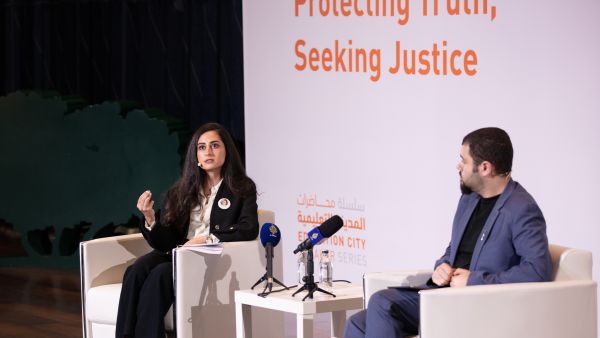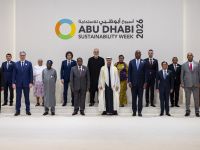Look through critical eyes to find the truth, palestinian justice campaigner tells QF’s education city speaker series

People around the world should recognize the importance of becoming media literate if they are to find their way through “different narratives, misinformation, and disinformation”, a Palestinian social justice advocate who is campaigning for the truth about her journalist aunt’s death has told Qatar Foundation’s Education City Speaker Series.
Lina Abu Akleh – niece of Shireen Abu Akleh, the Palestinian American correspondent for Al Jazeera, who was reporting on an Israeli military raid on Palestine when she was killed by Israeli Defence Forces in May – described her aunt’s death as an “insurmountable loss” that demonstrates how journalists everywhere need to be protected, saying: “We don’t want to see other families experience what we have”.
She told the audience at the talk, held in collaboration with Al Jazeera, how the fight for justice for Shireen that she and her family have embarked on has been spurred on by support from across the world, and how her aunt’s legacy will be how her independence, bravery, and compassion have inspired young women in the Arab world and beyond.
“Shireen was a journalist, so it is important for journalists everywhere to talk about her and advocate for her,” Abu Akleh told the latest edition of the Education City Speaker Series, titled Protecting Truth, Seeking Justice. “A threat to a journalist somewhere is a threat to journalists everywhere
“She shouldn’t be just another journalist killed, and it is important that journalists and journalistic associations continue to support, mobilize, and find mechanisms that ensure the protection of journalists in the field.”
Abu Akleh said her role in seeking justice for Shireen was powered by her aunt’s dedication to raising awareness of the occupation of Palestine, saying: “I realized this was the moment I needed to call for justice and accountability, and what has driven me to continue the journey was not because I have to, but because I want to – Shireen would have done the same if it was any one of us.
“My main message to journalists and journalism students is to continue to write and talk about Shireen, because to talk about her is to talk about her legacy and about Palestine. She has showed millions of young women that you can be anything you want, and that it is important to be empathetic and compassionate so you can understand the people you are writing about.
“My aunt is a perfect example of why speaking out against oppression is important. Constantly looking for the truth and including Palestinian voices is what she advocated for. She was there for the people – and she chose to be a journalist to be close to the people.”
Moderated by Al Jazeera senior journalist Jamal Elshayyal, the discussion saw Abu Akleh talk about the need to look at the world through a critical lens, saying: “One thing I learned when doing my undergraduate degree in media and communications was the importance of being media literate in an age and a time where we are faced with so many different narratives, misinformation, and disinformation.
“Exploring and looking at things critically, and trying to differentiate between different news outlets and how messages spread and the way they are shaped, is really important for a person trying to absorb all this information. Always be critical of what you read, look at different outlets rather than sticking to one, and seek the truth.”
And she also encouraged people to speak out for what they believe in, explaining: “At first, it was very difficult for me to go public and tweet [after Shireen’s death] because I thought it would not reach anyone.
“But after the fourth day, I realized people were listening and following what me and my family were doing, and the moment you start getting recognized for what you do is the moment you know you have made a difference, even if it is just a small step in the right direction. If you believe in a cause, you should advocate for it.”
Background Information
Qatar Foundation
Qatar Foundation (QF) is a non-profit organization made up of more than 50 entities working in education, research, and community development.
Our unique ecosystem—supported by partnerships with leading international institutions—is built on initiatives that address our most pressing challenges, create global opportunities, and empower people to shape our present and future.







